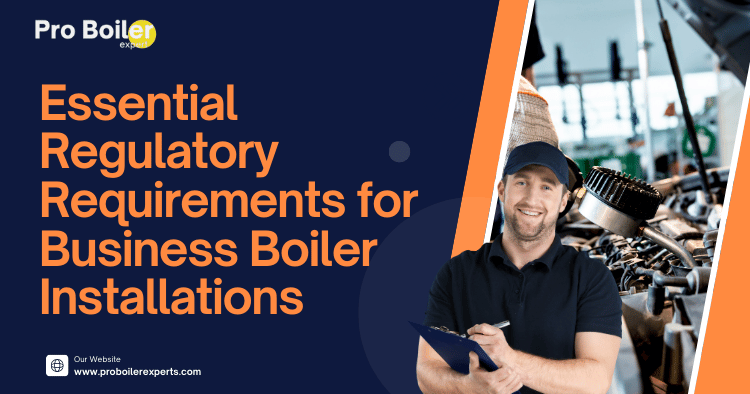Table of Contents
- Introduction to Boiler Installations
- Understanding Boiler Regulations
- Key Regulatory Bodies
- Types of Boiler Regulations
- Documentation and Compliance
- Safety and Maintenance Requirements
- Environmental Considerations
- FAQs
- Conclusion
Introduction to Boiler Installations
Boiler installations are critical in various industries, providing essential heating and hot water solutions. With the evolution of boiler technology and regulations, understanding the compliance landscape is more important than ever. This guide outlines the essential regulatory requirements that business owners must adhere to ensure safety, efficiency, and regulatory compliance in their boiler installations.
Understanding the regulatory landscape is not just about compliance; it’s about fostering a safe and efficient working environment for everyone involved.
Understanding Boiler Regulations
Boiler regulations are designed to govern the safe operation, installation, and maintenance of these systems. They ensure that boilers operate efficiently and safely, mitigating risks associated with boiler failures. Compliance with these regulations not only protects employees and the public but also minimizes environmental impacts.
Key Objectives of Boiler Regulations
- Safety: Protecting workers and the public from hazards associated with boiler operation.
- Efficiency: Promoting energy-efficient practices to reduce operational costs and environmental impact.
- Compliance: Ensuring businesses adhere to legal standards to avoid penalties.
Regulations serve as a framework that helps businesses operate within safe limits while maximizing efficiency.
Key Regulatory Bodies
Several organizations are responsible for establishing and enforcing boiler regulations:
| Regulatory Body | Role |
|---|---|
| Occupational Safety and Health Administration (OSHA) | Ensures workplace safety, including safe boiler operations. |
| Environmental Protection Agency (EPA) | Regulates emissions and environmental impacts of boiler operations. |
| American Society of Mechanical Engineers (ASME) | Provides standards for boiler design and maintenance. |
| National Board of Boiler and Pressure Vessel Inspectors | Oversees the inspection and certification of boilers. |
Familiarity with these organizations can help navigate the regulatory landscape effectively.
Engaging with these regulatory bodies can provide invaluable resources and guidance for your boiler installation projects.
Types of Boiler Regulations
Boiler regulations can vary based on location and specific business needs. Here are some common types:
- Installation Regulations: Guidelines for safe and efficient boiler installation.
- Operating Regulations: Standards governing daily boiler operations, including required personnel training.
- Inspection and Maintenance Regulations: Requirements for periodic inspections and maintenance tasks.
- Environmental Regulations: Compliance standards governing emissions and waste management.
Tips for Staying Compliant
- Consult with legal experts or compliance specialists to understand the specific regulations applicable to your business.
- Regularly review and update your understanding of local and federal regulations.
Proactive engagement with compliance can prevent costly fines and operational disruptions down the line.
Documentation and Compliance
Maintaining proper documentation is key to demonstrating compliance with regulatory requirements. Essential documents include:
| Document Type | Description |
|---|---|
| Boiler Installation Permit | Approval from local authorities for the installation. |
| Operating Logs | Daily logs documenting boiler operation, maintenance, and inspections. |
| Inspection Certificates | Documentation from certified inspectors confirming compliance. |
| Safety Procedures Manual | Guidelines for safe operation and emergency protocols. |
Having these documents readily available is critical for inspections and audits.
Proper documentation not only serves as proof of compliance but also enhances operational transparency and accountability.
Safety and Maintenance Requirements
Prioritizing safety in boiler operations is paramount. Key safety and maintenance requirements include:
- Regular Inspections: Schedule routine inspections to detect potential issues early.
- Training Programs: Ensure personnel operating the boiler are adequately trained and certified.
- Emergency Protocols: Develop clear emergency procedures and communicate them to all employees.
Best Practices for Boiler Maintenance
- Perform regular water quality tests to ensure proper functioning.
- Clean and remove any buildup of soot or scale.
- Continuously monitor pressure levels and temperature to identify anomalies.
Investing in training and maintenance pays off, as it not only ensures compliance but also enhances overall safety and efficiency.
Environmental Considerations
Boiler operations can significantly impact the environment, necessitating adherence to environmental regulations. Key considerations include:
- Emissions Control: Implement measures to limit emissions of pollutants, such as nitrogen oxides and particulate matter.
- Energy Efficiency: Use modern, energy-efficient boiler systems to minimize fuel consumption and emissions.
- Waste Management: Properly manage any waste products generated by boiler operations, adhering to local disposal regulations.
For more information on environmental regulations, visit the Environmental Protection Agency (EPA).
A commitment to environmental compliance not only fulfills legal obligations but also enhances corporate responsibility and public perception.
FAQs
What are the most common boiler regulations?
Common boiler regulations include installation standards, operational safety rules, and environmental emission limits.
How often should a boiler be inspected?
Typically, boilers should be inspected at least once a year, although high-use boilers may require more frequent inspections.
Who is responsible for ensuring compliance?
The business owner is ultimately responsible for ensuring all regulatory requirements are met. However, hiring designated compliance officers or consultants can assist with this task.
What happens if a business fails to comply with boiler regulations?
Non-compliance can result in fines, operational shutdowns, and potential legal action, alongside increased risks of accidents.
Awareness and adherence to regulations not only safeguard your operations but also protect your reputation as a responsible business entity.
Conclusion
Understanding and adhering to the essential regulatory requirements for boiler installations is vital for the safety and efficiency of your business operations. By familiarizing yourself with the various regulations, maintaining accurate documentation, and prioritizing safety, you can ensure that your boiler system operates smoothly and meets all necessary standards. For further information, consider reaching out to regulatory bodies or consulting with compliance experts. Remember, a safe boiler is a happy boiler!
Also Look For:
For additional insights related to boiler types, installation, and maintenance, check out the following resources:
- Top 5 Benefits of Choosing Combi Boilers for Your Home
- Essential Pre-Installation Checklist for Your New Boiler
- Top 5 Energy Efficiency Ratings for Your Boiler
- Top Boiler Brands: How Reputation Impacts Your Choice
- Top 5 Boiler Placement Tips for Optimal Efficiency
These links will provide you with comprehensive information to ensure you’re making informed decisions about your boiler installations and compliance.





